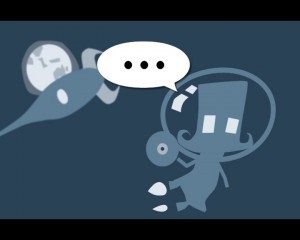If you listen to what mainstream media, corporate giants, and governments tell us about some Internet users of digital content you might expect bandanas, scimitars and pirates’ gold. Really, we are talking about average people with an Internet connection utilising digital content such as photographs, text and media for creative reinterpretation. As http://www.ferret.com.au explains, “Ideas are far easier to carry off than treasure chests laden with gold. You don’t have to kill people or risk your life to get them, and you are far less likely to get caught”

CC Mayer and Bettle Animation, screen grab from animation by Pete Foley,sound + music by Chris Perren, project coordination by Elliott Bledsloe from iCommons.au at QUT, 2005. The animation is an educational piece on creative commons, informing about artists' and digital content users' rights.
It would seem that the hysteria whipped up around copyright infringement and protection, has made online access to information and content even more difficult. Increasingly, regulatory practices employed by corporations, sees digital content being locked away. As a result of such cases as Grokster and Kazaa*, contributory copyright infringement (where a person or organization can be found liable for copyright infringement by someone else if they ‘authorised’ the infringement), has seen a bolstering of digital intellectual property rights. This includes most notably, the anti-circumvention provisions rights resulting from the Digital Agenda amendments to the Copyright Act, the imposition of a Digital Rights Management system, fee and subscription schemes, and end-user click-through licences. All act as weapons in the corporate Intellectual Property (IP) arsenal.
Despite large companies closing off access to cultural products, there is a whole collection of artistic works, media and archives that are itching to be utilised, but there has not been the finances or method to facilitate such a process. It is this kind of content – content that copyright owners do not have aversions to allowing use of, but do not actually know how to do so while still protecting their copyright – that Creative Commons aims to open up.
‘Sample, ‘Remix’ ‘Reuse’. Creative Commons is founded on these principles, but also a principle of a different kind – legal. The licensing scheme centres on prior permissions – content creators giving you permission to redistribute and in some cases rework their material, as a way of making and encouraging collaborative innovation. Creative Commons is about choice. It has turned the blanket ban tradition of copyright on its head. It takes the concept of “all rights reserved” and splices it into manageable parts in order to create a “some rights reserved” system.
In this edition of ANAT’s Filter Magazine, Mia Garlick, General Counsel of Creative Commons Corporations, a San Francisco-based not-for-profit corporation that works with volunteer project teams around the world, including Australia, to promote Creative Commons licenses and tools, will take you through the concepts behind the licences. Nic Suzor will take you through some ways to use the licences. Swashbuckler Andrew Garton of OPENChannel and Toy Satellite offers a sneak peak into the first major Australasian Creative Commons collaborative project involving Melbourne and Korean visual artists.
 * The Grokster (US) and Kazaa (Australia) cases focus on whether the developers of file sharing software should be liable for the copyright infringements of their users. The result for Kazaa – being found liable for copyright infringement; and Grokster – most probably to be found liable for contributory copyright infringement by the US Lower Courts in the near future.
* The Grokster (US) and Kazaa (Australia) cases focus on whether the developers of file sharing software should be liable for the copyright infringements of their users. The result for Kazaa – being found liable for copyright infringement; and Grokster – most probably to be found liable for contributory copyright infringement by the US Lower Courts in the near future.
Elliott Bledsoe
Elliott Bledsoe is a Bachelor of Laws/Arts student specialising in journalism and (unofficially), gender and sexuality studies. He also works with iCommons.au, the Australian Creative Commons licensing project. Elliott is on the Vibewire Youth Services Inc national steering committee that operates the online youth media portal vibewire.net. In his spare time, Elliott is a freelance journalist and designer, poet, media junky, social commentator and a philosophy wanker.
Read More
http://www.creativecommons.org.au/
http://creativecommons.org/
 This work is licensed under a Creative Commons Attribution-NonCommercial-ShareAlike 2.5 Australia.
This work is licensed under a Creative Commons Attribution-NonCommercial-ShareAlike 2.5 Australia.







[...] with the program, explaining the Creative Commons Australia licensing models and facilitating discussion around the uses and pitfalls of copyright in relation to creative [...]